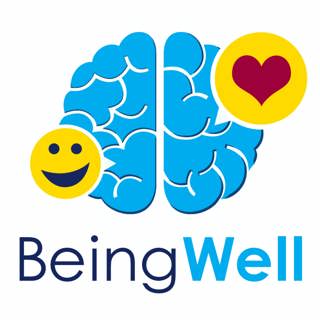
Ep. 9: Respond, Don't React
Learn how to respond to challenges from the “green zone” of the brain rather than reacting instinctively from the “red zone.” Dr. Hanson and Forrest explore the biology behind these two systems, the role of mindfulness in moving from one to the other, and how to combat the brain’s evolved negativity bias. Sponsor Message: We're now on Patreon! If you'd like to support the podcast, follow this link. If you'd like to start making real, positive changes to your brain and your life, but you don't have a lot of extra time, then you may want to check out Rick Hanson's new program: Just One Minute. Use the code BEINGWELL at checkout for 10% off the purchase price. Connect with the show: Visit us on the web Follow us on Instagram Follow Rick on Facebook Follow Forrest on Facebook Subscribe on iTunes The material in this podcast comes in large part from our book Resilient: How to Grow an Unshakable Core of Calm, Strength, and Happiness. If you like the podcast, you'll love the book! Timestamps: 0:45: The difference between “responding” and “reacting” 3:05: Responding vs. reacting in practice 6:45: The biology behind responding and reacting 9:10: The negative cycle of reacting 10:20: If reacting is stressful, why do we have that system? 12:40: Mindfulness and our reactions 13:25: What makes people respond rather than react? 16:20: The “quantity” vs. “quality” effect of green and red zone experiences 20:40: The cumulative effect of negative experiences 21:45: How to limit the impact of negative experiences 23:05: The positive spiral of taking in good experiences Learn more about your ad choices. Visit megaphone.fm/adchoices
5 Maalis 201827min

Ep. 8: How to Meet Your Needs
Dr. Hanson explains why it’s not so bad to be “needy.” We all have needs for safety, satisfaction, and connection, the question is how can we meet them skillfully? Sponsor Message: We're now on Patreon! If you'd like to support the podcast, follow this link. If you'd like to start making real, positive changes to your brain and your life, but you don't have a lot of extra time, then you may want to check out Rick Hanson's new program: Just One Minute. Use the code BEINGWELL at checkout for 10% off the purchase price. Connect with the show: Visit us on the web Follow us on Instagram Follow Rick on Facebook Follow Forrest on Facebook Subscribe on iTunes The material in this podcast comes in large part from our book Resilient: How to Grow an Unshakable Core of Calm, Strength, and Happiness. If you like the podcast, you'll love the book! Timestamps: 0:30: Why needs? 1:15: The three needs 2:55: Superficial needs 5:00: The role of mindfulness 6:00: Objections to our needs 7:00: Getting comfortable with neediness 7:50: The evolution of needs 9:00: How to address deep, rather than superficial, needs 11:30: How we can learn to distinguish between deep and superficial needs 13:00: The importance of internalization 14:20: Finding and meeting your key needs 16:20: Meeting needs by growing resources 18:20: Recap Learn more about your ad choices. Visit megaphone.fm/adchoices
27 Helmi 201820min

Ep. 7: Dealing with the Mind
The mind is a dangerous neighborhood, and there are three ways we can skillfully 'deal with' the often problematic neighbor that lives in our heads. Rick and Forrest explore how we can be with our experience, let go of negative thoughts and feelings, and plant new flowers in the garden of the mind. Sponsor Message: We're now on Patreon! If you'd like to support the podcast, follow this link. If you'd like to start making real, positive changes to your brain and your life, but you don't have a lot of extra time, then you may want to check out Rick Hanson's new program: Just One Minute. Use the code BEINGWELL at checkout for 10% off the purchase price. Connect with the show: Visit us on the web Follow us on Instagram Follow Rick on Facebook Follow Forrest on Facebook Subscribe on iTunes The material in this podcast comes in large part from our book Resilient: How to Grow an Unshakable Core of Calm, Strength, and Happiness. If you like the podcast, you'll love the book! Timestamps: 0:30: What do we mean by ‘dealing with the mind?’ 3:00: The three ways to deal with the mind 4:50: Why the mind is like a garden 7:00: How mindfulness applies to dealing with the mind 9:30: Why intervention can be diagnostic 11:00: How to practically work through negative material 12:45: How is opening to your ‘experience’ different from opening to your ‘trip’? 14:45: Why the mind is like a septic tank 16:20: Sensing beneath the surface of the mind 19:45: Language, planning, and the brain 22:15: Experiencing things ‘out’ 23:10: Being kind to yourself 24:00: How do we get ‘good things’ into the brain? 29:00: Recap Learn more about your ad choices. Visit megaphone.fm/adchoices
20 Helmi 201830min

Ep. 6: Mindfulness
Dr. Hanson and Forrest begin this month's topic of Mindfulness by focusing on how we can use mindfulness in practical ways in the flow of our daily lives. Sponsor Message: We're now on Patreon! If you'd like to support the podcast, follow this link. If you'd like to start making real, positive changes to your brain and your life, but you don't have a lot of extra time, then you may want to check out Rick Hanson's new program: Just One Minute. Use the code BEINGWELL at checkout for 10% off the purchase price. Connect with the show: Visit us on the web Follow us on Instagram Follow Rick on Facebook Follow Forrest on Facebook Subscribe on iTunes The material in this podcast comes in large part from our book Resilient: How to Grow an Unshakable Core of Calm, Strength, and Happiness. If you like the podcast, you'll love the book! Timestamps: 0:45: What do we mean by "mindfulness"? 2:05: Two ways to apply mindfulness 3:45: Mindfulness as a tool 5:15: What are you using mindfulness to DO? 6:15: How can we use mindfulness to grow strengths? 9:00: The banquet table of life 10:10: Benefits and pitfalls of mindfulness 10:55: Why does mindfulness cause us to develop positive traits? 11:40: How can we become more mindful moment to moment? 13:00: The brain's unreliable narration 14:25: Being mindful of our own tendencies 16:40: How to grow mindfulness Learn more about your ad choices. Visit megaphone.fm/adchoices
12 Helmi 201820min

Ep. 5: Take the Time to Enjoy Life
Dr. Rick Hanson explains why enjoying life is both easy to dismiss and surprisingly hard to do. Particularly, he explores how we can authentically find enjoyable moments even during very difficult times in our lives. Sponsor Message: We're now on Patreon! If you'd like to support the podcast, follow this link. If you'd like to start making real, positive changes to your brain and your life, but you don't have a lot of extra time, then you may want to check out Rick Hanson's new program: Just One Minute. Use the code BEINGWELL at checkout for 10% off the purchase price. Connect with the show: Visit us on the web Follow us on Instagram Follow Rick on Facebook Follow Forrest on Facebook Subscribe on iTunes The material in this podcast comes in large part from our book Resilient: How to Grow an Unshakable Core of Calm, Strength, and Happiness. If you like the podcast, you'll love the book! Timestamps: 0:35: Why is enjoying life a strength to develop? 2:00: Enjoyment and the brain 3:15: The importance of key experiences. 4:30: Our cultural pitfalls around enjoyment. 7:30: How do we grow strengths? The problem with having a “stiff upper lip.” 8:40: What needs to be present alongside adversity for it to become an inner strength? 11:00: Learning from bad experiences. 12:15: Experiencing vs. Internalizing. 15:15: Finding enjoyment anywhere. Learn more about your ad choices. Visit megaphone.fm/adchoices
5 Helmi 201818min

Ep. 4: Accept to Grow
On this episode of the Being Well Podcast, Dr. Hanson and Forrest focus on the importance of acceptance. Particularly, they talk about how an authentic moment of acceptance can be a catalyst for positive growth. Sponsor Message: We're now on Patreon! If you'd like to support the podcast, follow this link. If you'd like to start making real, positive changes to your brain and your life, but you don't have a lot of extra time, then you may want to check out Rick Hanson's new program: Just One Minute. Use the code BEINGWELL at checkout for 10% off the purchase price. Connect with the show: Visit us on the web Follow us on Instagram Follow Rick on Facebook Follow Forrest on Facebook Subscribe on iTunes The material in this podcast comes in large part from our book Resilient: How to Grow an Unshakable Core of Calm, Strength, and Happiness. If you like the podcast, you'll love the book! Timestamps: 0:30: The importance of facing what's true. 1:45: Feeling acceptance along with something else. 2:40: Using acceptance as a catalyst for creating change. 4:10: How can I turn "acceptance" into something useful? 5:25: What are we accepting?/Aspects of acceptance. 8:30: Can we accept elements of ourselves? 9:55: How can we get better at acceptance? 10:35: The house of the self. 13:00: Practices to grow self-acceptance. 15:45: The fastest way to defuse an argument. 18:35: Recap and close. Learn more about your ad choices. Visit megaphone.fm/adchoices
29 Tammi 201820min

Ep. 3: How to Grow Self-Compassion
How we can use self-compassion to reduce rumination, feel safe while taking big risks, and improve our relationships with other people. Dr. Hanson and Forrest also explore what makes self-compassion different from self-pity or being on your own side. Sponsor Message: We're now on Patreon! If you'd like to support the podcast, follow this link. If you'd like to start making real, positive changes to your brain and your life, but you don't have a lot of extra time, then you may want to check out Rick Hanson's new program: Just One Minute. Use the code BEINGWELL at checkout for 10% off the purchase price. Connect with the show: Visit us on the web Follow us on Instagram Follow Rick on Facebook Follow Forrest on Facebook Subscribe on iTunes The material in this podcast comes in large part from our book Resilient: How to Grow an Unshakable Core of Calm, Strength, and Happiness. If you like the podcast, you'll love the book! Timestamps: 0:15: What are the benefits of self-compassion? 1:30: How is self-compassion different from "being on your own side"? 1:55: What's the difference between self-compassion and self-pity? 2:30: How can we be compassionate to ourselves without coming across like a complainer? 4:20: The fastest way to get people to stop talking AT you. 5:55: Using self-compassion to fight rumination 8:15: The function of rumination: avoiding a dreaded experience. 11:00: How to become more self-compassionate. 16:53: Summary and ending. Learn more about your ad choices. Visit megaphone.fm/adchoices
22 Tammi 201818min

Ep. 2: Being On Your Own Side
Dr. Hanson focuses on the importance of self-compassion - and particularly on why it's important to get "on your own side" in order to create lasting, positive change in the brain. Sponsor Message: We're now on Patreon! If you'd like to support the podcast, follow this link. If you'd like to start making real, positive changes to your brain and your life, but you don't have a lot of extra time, then you may want to check out Rick Hanson's new program: Just One Minute. Use the code BEINGWELL at checkout for 10% off the purchase price. The material in this podcast comes in large part from our book Resilient: How to Grow an Unshakable Core of Calm, Strength, and Happiness. If you like the podcast, you'll love the book! Connect with the show: Visit us on the web Follow us on Instagram Follow Rick on Facebook Follow Forrest on Facebook Subscribe on iTunes Timestamps: 0:35: Why start with compassion? 2:10: Why it's important to be on your own side. 4:30: Why does being for yourself promote well-being? 5:45: The importance of coping. 7:30: How do we get better at being for ourselves? 11:15: How to be consistent AFTER inspiration passes. 17:05: Recap Learn more about your ad choices. Visit megaphone.fm/adchoices
16 Tammi 201819min






















